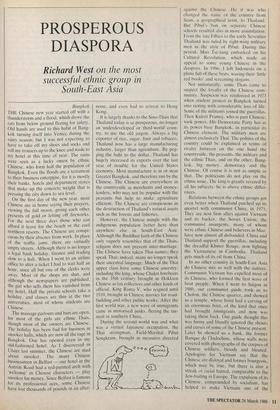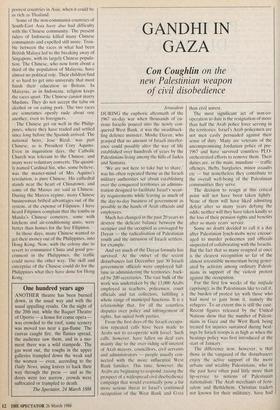PROSPEROUS DIASPORA
Richard West on the most successful ethnic group in - South-East Asia
Bangkok THE Chinese new year started off with a thunderstorm and a flood, which drove the rats from below ground fleeing for safety. Old hands are used to this habit of Bang- kok turning itself into Venice during the rainy. season; but I was not expecting to have to take off my shoes and socks and roll my trousers up to the knee and wade to my hotel at this time of year. The rains were seen as a lucky omen by ethnic Chinese, who form half the population of Bangkok. Even the floods are a testament to their business enterprise, for it is mostly their banks, hotels and department stores that make up the concrete weight that is pressing the city down to sea level.
On the first day of the new year, most Chinese are at home saying their prayers, viewing the full moon, giving each other presents of gold or letting off fireworks. For the next three days those who can afford it leave for the beach or the cool northern resorts. The Chinese are conspi- cuous by their absence from work. In place of the traffic jams. there are virtually empty streets. Although there is no longer :1 legal bank holiday, finance and trading slow to a halt. When I went to an airline office to alter a ticket I had to wait half an -hour, since all but one of the clerks were away. Most of the shops are shut, and although the newspapers are published, the girl who sells them has vanished from my hotel. Half the private schools take a holiday, and classes are thin at the two universities, most of whose students are Chinese.
The massage parlours and bars are open, for most of the girls are ethnic Thais, though most of the owners are Chinese. The holiday has been bad for business in snooker halls, which are now all the rage in Bangkok. One has opened even in my old-fashioned hotel. As I discovered in Ulster last summer, the Chinese are mad about snooker. The many Chinese businessmen in Belfast — our hotel in the Antrim Road had a red-painted arch with 'welcome' in Chinese characters — play snooker for money. Since Belfast is famous for its professional aces, some Chinese have lost thousands of pounds in an after- noon, and even had to retreat to Hong Kong.
It is largely thanks to the Sino-Thais that Thailand today is so prosperous, no longer an 'underdeveloped' or 'third world' coun- try, to use the old jargon. Always a big exporter of rice, sugar, fruit and tobacco. Thailand now has a large manufacturing industry, larger than agriculture. By peg- ging the .baht to the dollar, Thailand has hugely increased its exports over the last year of trouble for the United States economy. Most manufacture is in or near Greater Bangkok, and therefore run by the Chinese. The Chinese are everywhere in the countryside as merchants and money- lenders, who may not be popular with the peasants but help to make agriculture efficient. The Chinese are conspicuous in the destruction of Thailand's natural assets such as the forests and fisheries.
However, the Chinese mingle with the indigenous population better here than anywhere else in South-East Asia. Although the Buddhist faith of the Chinese only vaguely resembles that of the Thais, religion does not prevent inter-marriage. The Chinese have taken Thai names; they speak Thai; indeed, many no longer speak their ancestral language. Much of the Thai upper class have some Chinese ancestry, including the king, whose Chakri forebears in the 18th century brought in Hokkien Chinese as tax collectors and other kinds of official. King Rama V, who reigned until 1910, brought in Chinese navvies for road- building and other public works. After the first world war, a new wave of immigrants came in motorised junks, fleeing the tur- moil in southern China.
During the second world war and what was a virtual Japanese occupation, the Thai strongman, Field-Marshal Pibul Songkram, brought in measures directed
against the Chinese. I le it was who changed the name of the country from Siam, a geographical term, to Thailand. But Pihul's ban on separate Chinese schools resulted also in more assimilation. From the late Fifties to the early Seventies Thailand was ruled by right-wing military men in the style of Pibul. During this period, Mao Tse-tung embarked on his Cultural Revolution, which made an appeal to some young Chinese. in the diaspora. In 1966, I left Indonesia on a plane full of these brats, waving their little red books' and screaming slogans.
Not unnaturally, some Thais came to suspect the loyalty of the Chinese com- munity. Suspicion was reinforced in 1973 when student protest in Bangkok turned into rioting with. considerable loss of life. Some of the militants joined the guerrillas. Then Kukrit Pramoj. who is part Chinese. took power. His Democratic Party has as its power base Bangkok, in particular its Chinese element. The military men are almost exclusively Thai. The politics of the country could be explained in terms of riv airy between on the one hand the countryside. the peasants, the military and the ethnic Thais. and on the other. Bang- kok, big money, democracy and the Chinese. Of course it is not as simple as that. The politicians do not play on the ethnic issue. The king is greatly revered by all his subjects: he is above ethnic differ- ences.
Relations between the ethnic groups got even better when Thailand patched up its quarrel with communist China, in 1975.
They are now firm allies against Vietnam and its hacker, the Soviet Union; . the communist insurgents, many of whom were ethnic Chinese and believers in Mao, have now almost all disbanded. China and Thailand support the guerrillas, including the dreadful Khmer Rouge, now fighting the Vietnamese in 'Cambodia. Thailand gets much of its oil from China.
In no other country in South-East Asia do Chinese mix so well with the natives.
Communist Vietnam has expelled most of its Chinese, who formed the first wave of boat people. When I went to Saigon in 1980, our communist guide took us to Cholon, the Chinese quarter, and showed us a temple, whose front had a carving of an enormous boat, of the kind that once had brought immigrants and now was taking them hack. Our guide thought this was funny and blandly ignored the shouts and curses of some of the Chinese present. Later he showed us a hank, the former Banque de l'Indochine, whose walls were covered with photographs of the corpses of Chinese soldiers, bloody and bloated. Apologists for Vietnam say that the Chinese are disloyal and former bourgeois, which may be true, but there is also a streak of racial hatred, comparable to the Jew-baiting in Europe. The expulsion of its Chinese, compounded by socialism, has helped to make Vietnam one of the poorest countries in Asia, when it could he as rich as Thailand.
Some of the non-communist countries of South-East Asia have also had difficulty with the Chinese community. The present rulers of Indonesia killed many Chinese communists and expelled still more. Trou- ble between the races in what had been British Malaya led to the breaking away of Singapore, with its largely Chinese popula- tion: The Chinese, who now form about a third of the population of Malaysia, have almost no political role. Their children find it so hard to get into university that most finish their education in Britain. In Malaysia, as in Indonesia, religion keeps the races apart. The Chinese cannot marry Muslims. They do not accept the tabu on alcohol or on eating pork. The two races are sometimes openly rude about one another, even to foreigners.
The Chinese get on well in the Philip- pines, where they have traded and settled since long before the Spanish arrived. The national hero, Jose Rizal, was part Chinese, as is President Cory Aquino.
Even in inquisition days, the Catholic Church was tolerant to the Chinese, and many were voluntary converts. The quaint- ly named Cardinal Sin, who, some believe, was the master-mind of Mrs Aquino's revolution, is pure Chinese. His cathedral stands near the heart of Chinatown, and some of the Masses are said in Chinese. During the Marcos regime, many Chinese businessman bribed advantages out of the system, at the expense of Filipinos. I have heard Filipinos complain that the tombs in Manila's Chinese cemetery, some with kitchens and air-conditioning units, were better than homes for the live Filipinos.
In those days,. many Chinese wanted to get their money out of the Philippines, into Hong Kong. Now, with the colony due to revert to communist China and good gov- ernment in the Philippines, the traffic could move the other way. The skill and enterprise of the Chinese could do for the Philippines what they have done for Hong Kong.



















































 Previous page
Previous page